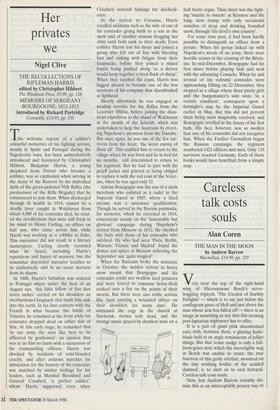Her privates we
Nigel Clive
THE RECOLLECTIONS OF RIFLEMAN HARRIS edited by Christopher Hibbert The Windrush Press, £9.99, pp. 128 MEMOIRS OF SERGEANT BOURGOGNE, 1812-1813 introduced by Richard Partridge Constable, £14.95, pp. 356 his welcome reprint of a soldier's colourful memories of his fighting service, mostly in Spain and Portugal during the Napoleonic wars, has been authoritatively introduced and footnoted by Christopher Hibbert. Benjamin Harris, a young shepherd from Dorset who became a cobbler, was so captivated when serving in the Army of the Reserve by the individual skills of the green-jacketed 95th Rifles (the predecessor of the Rifle Brigade) that he volunteered to join them. When discharged through ill health in 1814, caused by a deadly fever caught in Walcheren from which 4,000 of his comrades died, he relat- ed the recollections that were still fresh in his mind to Henry Curling, an officer on half pay, who came across him while Harris was working as a cobbler in Soho. This encounter did not result in a literary masterpiece. Curling clearly recorded what he heard, including Harris's repetitions and lapses of memory, but the somewhat disjointed narrative testifies to its authenticity and in no sense detracts from its charm.
In 1808, Harris's battalion was ordered to Portugal where under the heat of an August sun, 'this little fellow of five feet seven inches' carried on his shoulders an overburdened knapsack that made him sink into the earth. In his first contacts with the French in what became the battle of Vimeiro, he remained at the front while his comrades dropped dead on either side of him. At this early stage, he remarked that 'in our army the men like best to be officered by gentlemen': an opinion that was to do him no harm with a succession of his commanding officers. Harris was shocked by incidents of cold-blooded cruelty, and after arduous marches his admiration for the bravery of his comrades was matched by similar feelings for his leaders, such as Marshal Beresford and General Craufurd, 'a perfect soldier', whom Harris supported even when Craufurd ordered lashings for disobedi- ence.
In the retreat to Corunna, Harris recalled incidents such as the wife of one of his comrades giving birth to a son in the snow and of another woman dragging her child until both sank to their death. Even cobbler Harris lost his shoes and joined a group who fell out of line with bleeding feet and sinking with fatigue from their knapsacks, before they joined a mixed bunch being pushed along 'as a drover would keep together a tired flock of sheep'. When they reached the coast, Harris was lugged aboard to become one of the few survivors of his company that disembarked at Spithead.
Shortly afterwards he was engaged in stealing recruits for the Rifles from the Leicester Militia, before joining the disas- trous expedition to the island of Walcheren at the mouth of the Scheldt, which was undertaken to help the Austrians by divert- ing Napoleon's attention from the Danube. But once again, he was one of the few sur- vivors from the fever, 'the worst enemy of them all'. This enabled him to return to the village where he was born and lie in bed for six months, still determined to return to his regiment. But he had to part with his greeii jacket and grieved at being obliged to replace it with the red coat of the Veter- ans, when he was aged only 32.
Adrian Bourgogne was the son of a cloth merchant who enlisted as a cadet in the Imperial Guard in 1805, where a fixed income was a necessary qualification. Though he served in the Iberian peninsula, his memoirs, which he recorded in 1814, concentrate mostly on the 'lamentable but glorious' campaign during Napoleon's retreat from Moscow in 1812. He checked the facts with those of his comrades who survived. He who had seen 'Paris, Berlin, Warsaw, Vienna and Madrid' found the domes and spires of Moscow reflecting the September sun 'quite magical'.
When the Russians broke the armistice in October, the sudden retreat in heavy snow meant that Bourgogne and his comrades could not swallow iced potatoes and were forced to consume horse-flesh cooked over a fire on the points of their swords. But there were also noble actions like 'men carrying a wounded officer on their shoulders for many days'. He witnessed the orgy in the church at Smolensk, strewn with dead, and the strange music played by drunken men on a half burnt organ. Then there was the fight- ing 'muzzle to muzzle' at Krasnoe and the long, slow tramp with only occasional snatches of sleep and drinking brandied snow, through 'the devil's own country'.
For some time past, it had been hardly possible to distinguish an officer from a private. When his group linked up with Napoleon's wreck of an army, there were horrific scenes in the crossing of the Berez- ina. In mid-December, Bourgogne had his first shave before playing hide and seek with the advancing Cossacks. When he and several of his refound comrades were approaching Elbing on 22 December, they stopped at a village where three pretty girls and the burgomaster's wife were 'in a certain condition', consequent upon a fortnight's stay by the Imperial Guard earlier in May. But this did not prevent them being most hospitably received, and Bourgogne revelled in the luxury of his first bath. His face, however, was so swollen that one of his comrades did not recognise him. When the Fusilier Grenadiers began the Russian campaign, the regiment numbered 1421 officers and men. Only 118 survivors reached Germany. Each of these books would have benefited from a 'simple map.


























































 Previous page
Previous page